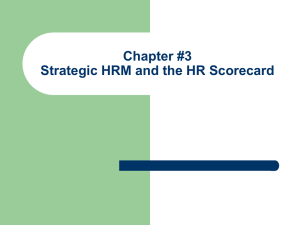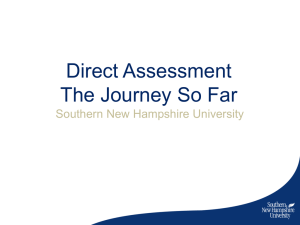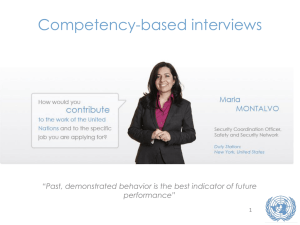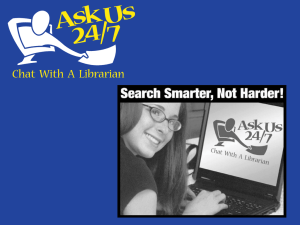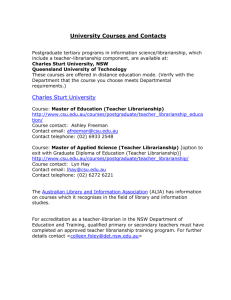Designing a Library Staff Development Plan
advertisement
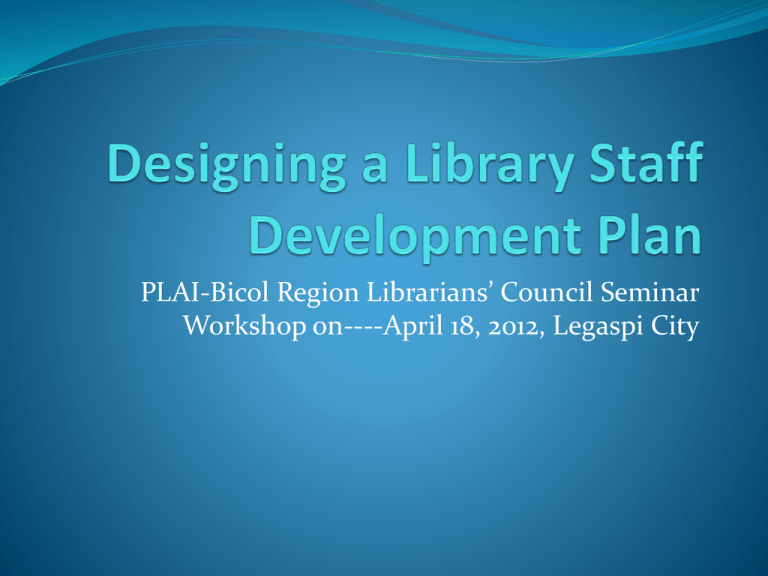
PLAI-Bicol Region Librarians’ Council Seminar Workshop on----April 18, 2012, Legaspi City RA 9246 An Act Modernizing the Practice of Librarianship in the Philippines. Known as “The Philippine Librarianship Act of 2003” (Feb 19, 2004) Repeals Republic Act No. 6966, Entitled: "An Act Regulating the Practice of Librarianship and Prescribing The Qualifications of Librarians.” Provides for the scope of the Licensure Examination for Librarians Art III. Section 16. Scope of Examination 1) Selection and acquisition of multi-media sources of information 2) Cataloguing and classification; 3) Indexing and abstracting; 4) Reference, bibliography and information services; Art III. Section 16. Scope of Examination 5) Organization, management and development and maintenance of multi-media based library or information service, laws, trends and practices affecting the profession; and 6) Information technology. *The Board is hereby authorized to modify or add to the subjects listed above as the needs and demands in the library profession may require. Art I. Section 5. Scope of the Practice of Librarianship Librarianship shall deal with the performance of the librarian's functions, which shall include, but not be limited to the following: 1) Selection and acquisition of multi-media sources of information which would best respond to clientele's need for adequate, relevant and timely information; Art I. Section 5. Scope of the Practice of Librarianship 2) Cataloguing and classification of knowledge or sources of information into relevant organized collections and creation of local databases for speedy access, retrieval or delivery of information; 3) Development of computerassisted/computer-backed information systems which would permit online and network services; Art I. Section 5. Scope of the Practice of Librarianship 4) Establishment of library system and procedures; dissemination of information; rendering of information, reference and research assistance; archiving; and education of users; 5) Teaching, lecturing and reviewing of library, archives and information science subjects, including subjects given in the licensure examination; Art I. Section 5. Scope of the Practice of Librarianship 6) Rendering of services involving technical knowledge/expertise in abstracting, indexing, cataloguing and classifying' or the preparation of bibliographies, subject authority lists, thesauri and union catalogues/lists; 7) Preparation, evaluation or appraisal of plans, programs and/or projects for the establishment, organization, development and growth of libraries or information centers, and the determination of library requirements for space, buildings, structures or facilities; Art I. Section 5. Scope of the Practice of Librarianship 8) Provision of professional and consultancy services or advice on any aspect of librarianship; and 9) Organization, conservation, preservation and restoration of historical and cultural documents and other intellectual properties. Reasons for Devising a Staff Development Program Need to develop professional, personal and higher level competencies Need to adapt to the changing library landscape Need to adapt to the changing wants, habits, and abilities of users Need to develop leaders Needed Staff Competencies Professional competencies relate to the staff’s knowledge of information resources, access, technology and management. Personal competencies relate to the staff’s set of attitudes, skill and values that enable him/her to work effectively and contribute positively to the library, clients and the profession. Core competencies relate to professional and personal competencies that enable the individual to contribute positively to the profession (Special Libraries Association. (Revised 2003). http://www.sla.org/competencies) Changing Library Landscape Information is in multimedia format Digital, networked and online access via PCs and online devices are the norms Interaction and collaboration is face to face in the learning commons or via social networking tools Do it yourself services are available Today’s Students Digital Natives Use Internet Technology for education, music, communication, movies . Multi tasking Intolerant of delays Are interactive, active learners Intuitive visual communicators Inquisitive and learn through discovery Need to develop leaders A good leader knows that he cannot do it alone. for an organization to succeed he needs a good team of potential leaders with the same vision and passion and who would carry the load with him. Staff Development Plan One of the ways to ensure the development of the library into an efficient and effective information organization is to foster a culture of continuous learning in which all staff are engaged in strengthening their skills and knowledge at all times. Steps in Designing a Staff Development Plan Analyze the profile data of the library staff to identify the level of competencies required Identify possible competency gaps Prepare a training roadmap for each staff Identify providers of training or conduct in-service training Evaluate results of the training Needed Professional Competencies Relate to the practitioner’s knowledge of information resources, access, technology and management, and the ability to use this knowledge as a basis for providing the highest quality information services. (“Competencies for Information Professionals of the 21st Century,” 2003). Each of these competencies is described through specific skills that must be acquired and demonstrated Managing information organizations Managing information resources Managing information services Applying information tools and technologies 1. Managing Information Organizations Description: Organization, management and development and maintenance of multi-media based library or information service, laws, trends and practices affecting the profession; At the end of the training the librarian is expected to: Align the library with the strategic directions of the parent organization Assess and communicate the value of the library to administration and to clients Establish effective operational and financial management processes Build and lead an effective team of library staff Advise the organization and clients on copyright and intellectual property issues 2. Managing Information Resources Description: Selection and acquisition of multi-media sources of information; Cataloguing and classification; Indexing and abstracting; Preservation and conservation; Withdrawal or weeding At the end of the training program, the librarian is expected to: Build a dynamic collection of and other information materials based on the need of the clients. Organize the information materials through standard cataloguing, and indexing principles Preserve books and other information materials through careful handling, binding, and repair Weed or withdraw books and other information materials that are no longer 3. Managing Information Services Description: Reference, bibliography and information services At the end of the training, the library librarian is expected to: Develop and maintain cost effective and value added reference and information services Conduct research on the information needs and behaviors of clients Develop measures to continually asses the quality of information services offered for purposes of improving the service 4. Applying Information Tools and Services Description: Use of Information technology in the whole cycle of information management At the end of the training, the library staff/librarian is expected to: Assess, select and apply current ICT tools Use ICT tools effectively in acquisition, cataloguing, indexing, reference services and library management areas. Needed Personal Competencies Represent a set of attitudes, skill and values that enable practitioners to work effectively and contribute positively to their organizations, clients and profession. “Competencies for special librarians of the 21st Century,” Full report ( 2003). Needed Personal Competencies Communicates effectively Builds an environment of mutual respect and trust Sees the big picture Thinks creatively and innovatively Remains flexible in a time of continuing change Manages and develops self 1. Communicates Effectively Description: Presents ideas clearly and in correct grammatical language in both in oral and written form and always in the “language” of the audience with an understanding of their perception. At the end of the training the library staff/librarian is expected to present his/her ideas clearly in both written and oral form 2. Builds an environment of mutual respect and trust Description: Works effectively with colleagues and fosters unity towards attaining goals At the end of the training the library staff/librarian is expected to: Give or accept assistance as needed Acknowledge contributions of team members Value diversity Builds rapport, displays pleasant and positive disposition. 3. Sees the big picture Description: Views the library as part of the bigger organization thus providing priority to the demands of the organization and its clients At the end of the training, the library staff/librarian is expected to: Understand the environment in which the parent organization is operating and steers the library to contribute to these operations 4. Thinks Creatively and Innovatively Description: Examines how present operations and services could be improved. Monitors trends and how these could be applied to the library At the end of the training program, the library staff/librarian is expected to: Recognize provide solutions to situations where improvement is necessary Be aware of trends in the profession and how these could be applied to the library 5. Remains Flexible in a Time of Continuing Change Definition: Change is happening constantly, staff must be aware that roles operations and are changing At the end of the training program, the library staff/librarian is expected to: Willingly assume different responsibilities at different times Accepts changes in operations as dictated by trends and user needs 6. Manages and Develops Self Description: Improves personal and professional life continuously At the end of the training program, library staff/librarian is expected to: Pursue continuous learning, show perseverance, receptivity to feedback, balance between work and other life activities, and celebrate achievement of self and others Needed Core Competencies Contributes to knowledge base of the profession— Conducts research, publishes results of research, presents papers at conferences Commits to professional excellence and ethics and to the values and principles of the profession—Acts in accordance with the code of ethics for librarians. Qualities of Good Leaders 1. Positiveness—the ability to work with and see people and situations in a positive way 2. Servanthood—the willingness to submit, play team ball, and follow the leader Qualities of Good Leaders 3. Growth potential—a hunger for personal growth and development; the ability to keep growing as the job expands 4. Follow-through— the determination to get the job done completely and with consistency Qualities of Good Leaders 5. Loyalty—the willingness to always put the leader and the organization above personal desires. 6. Resiliency—the ability to bounce back when problems arise Qualities of Good Leaders 7. Integrity—trustworthiness and solid character; consistent words and walk 8. “Big picture” mind-set—the ability to see the whole organization and all of its needs Qualities of Good Leaders 9. Discipline—the willingness to do what is required regardless of personal mood 10. Gratitude—an attitude of thankfulness that becomes a way of life. You will Know that You are Successful if You have a Team with members who care for one another know what is important communicate with one another grow together trust one another You will Know that You are Successful if You have a Team with members who have special roles to play but work as partners place their individual rights beneath the interest of the team are willing to pay the price are training new leaders Workshop Brainstorm on the following: Evaluate yourself /your staff in terms of professional, personal and core competencies. Make a vision statement about what you/your library staff must achieve in the next three years. Prepare three SMART (S=specific, M=Measurable, A=Attainable, R=Relevant; T=Time-based (Zahorsky, 2010) goals. One each for the professional, personal and for librarians, their core competencies. The level will depend on the academic qualifications of the staff. Think of strategies to reach your goals. Think of measures to determine success Questions to Ask Are my present knowledge and skills appropriate to the vision of my library? What knowledge and skills must I acquire and maintain to better serve my institution? What are my immediate objectives? What strategies must I implement to reach my objectives? What are the implications of these strategies? How do I measure the success of my development plan? References Alberton, Rosie L. and Thomas W. Shaughnessy (1990). Developing leadership skills. Englewood, Colo: Libraries Unlimited, Inc. Maxwell, John C. (1995). Developing the leaders around you. Nashville: Thomas Nelson Pub. Mosley, Pixey Anne (2004) Transitioning from librarian to middle manager. Westport:Conn: Libraries Unlimited, Inc. Republic of the Philippines. Congress of the Philippines. Republic Act 9246. An Act Modernizing the Practice of Librarianship in the Philippines thereby repealing Republic Act 6966, entitled “An Act Regulating the Practice of Librarianship and Prescribing the Qualifications of Librarians,” Appropriating Funds therefor and for other Purposes. Feb 19, 2004 References Special Libraries Association. Competencies for information professionals of the 21st Century. (Revised 2003). http://www.sla.org/competencies (Accessed April 12, 2010) Tennant, Roy (2005) “Roy Tennant Inspires II”. Posted by Michael Stephens in Tame the Web: Libraries, Technology, People. May 2005. http://tametheweb.com/2005/05/17/roytennant-inspires-ii/ (Accessed April 25, 2010) Tennant, Roy (2007). In SLA Blog posted by Stacey Greenwell. http://slablogger.typepad.com/sla_blog/2007/06/the_only_co nsta.html (Accessed on April 25, 2010) Tichy, Noel M. (2002). With Nancy Cardwell. The cycle of leadership: How great leaders teach their companies to win. NY: Harper Business. Zahorsky, Darrel (2010) The 5 steps to setting SMART business goals. In About.com: small business information) http://sbinformation.about.com/od/businessmanageme n1/a/businessgoals.htm (Accessed April 25, 2010). Thank You. Lourdes T. David Director Rizal Library Ateneo de Manila University ltdavid@ateneo.edu lourdesdav@gmail.co m




